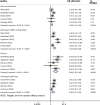Impact of frailty on short-term postoperative outcomes in patients undergoing colorectal cancer surgery: A systematic review and meta-analysis
- PMID: 38577090
- PMCID: PMC10989331
- DOI: 10.4240/wjgs.v16.i3.893
Impact of frailty on short-term postoperative outcomes in patients undergoing colorectal cancer surgery: A systematic review and meta-analysis
Abstract
Background: Colorectal cancer is a major global health challenge that predominantly affects older people. Surgical management, despite advancements, requires careful consideration of preoperative patient status for optimal outcomes.
Aim: To summarize existing evidence on the association of frailty with short-term postoperative outcomes in patients undergoing colorectal cancer surgery.
Methods: A literature search was conducted using PubMed, EMBASE and Scopus databases for observational studies in adult patients aged ≥ 18 years undergoing planned or elective colorectal surgery for primary carcinoma and/or secondary metastasis. Only studies that conducted frailty assessment using recognized frailty assessment tools and had a comparator group, comprising nonfrail patients, were included. Pooled effect sizes were reported as weighted mean difference or relative risk (RR) with 95% confidence intervals (CIs).
Results: A total of 24 studies were included. Compared with nonfrail patients, frailty was associated with an increased risk of mortality at 30 d (RR: 1.99, 95%CI: 1.47-2.69), at 90 d (RR: 4.76, 95%CI: 1.56-14.6) and at 1 year (RR: 5.73, 95%CI: 2.74-12.0) of follow up. Frail patients had an increased risk of any complications (RR: 1.81, 95%CI: 1.57-2.10) as well as major complications (Clavien-Dindo classification grade ≥ III) (RR: 2.87, 95%CI: 1.65-4.99) compared with the control group. The risk of reoperation (RR: 1.18, 95%CI: 1.07-1.31), readmission (RR: 1.70, 95%CI: 1.36-2.12), need for blood transfusion (RR: 1.67, 95%CI: 1.52-1.85), wound complications (RR: 1.49, 95%CI: 1.11-1.99), delirium (RR: 4.60, 95%CI: 2.31-9.16), risk of prolonged hospitalization (RR: 2.09, 95%CI: 1.22-3.60) and discharge to a skilled nursing facility or rehabilitation center (RR: 3.19, 95%CI: 2.0-5.08) was all higher in frail patients.
Conclusion: Frailty in colorectal cancer surgery patients was associated with more complications, longer hospital stays, higher reoperation risk, and increased mortality. Integrating frailty assessment appears crucial for tailored surgical management.
Keywords: Colorectal cancer; Colorectal surgery; Complications; Frail adults; Frailty; Meta-analysis; Mortality; Slinical outcomes; Survival.
©The Author(s) 2024. Published by Baishideng Publishing Group Inc. All rights reserved.
Conflict of interest statement
Conflict-of-interest statement: The authors declare that they have no conflict of interest.
Figures






Similar articles
-
Impact of frailty on postoperative outcomes after hepatectomy: A systematic review and meta-analysis.World J Gastrointest Surg. 2024 Jul 27;16(7):2319-2328. doi: 10.4240/wjgs.v16.i7.2319. World J Gastrointest Surg. 2024. PMID: 39087100 Free PMC article.
-
Frailty and risk of complications in head and neck oncologic surgery. Systematic review and dose-response meta-analysis.Med Oral Patol Oral Cir Bucal. 2021 Sep 1;26(5):e582-e589. doi: 10.4317/medoral.24588. Med Oral Patol Oral Cir Bucal. 2021. PMID: 34414998 Free PMC article.
-
Frailty Status as a Predictor of Outcomes in Emergency Surgeries for Older Adults: A Systematic Review and Meta-Analysis.Cureus. 2025 May 15;17(5):e84160. doi: 10.7759/cureus.84160. eCollection 2025 May. Cureus. 2025. PMID: 40519493 Free PMC article. Review.
-
Frailty as a predictor of adverse outcomes in hospitalized older adults: A systematic review and meta-analysis.Ageing Res Rev. 2019 Dec;56:100960. doi: 10.1016/j.arr.2019.100960. Epub 2019 Sep 10. Ageing Res Rev. 2019. PMID: 31518686
-
Influence of Frailty on Outcome in Older Patients Undergoing Non-Cardiac Surgery - A Systematic Review and Meta-Analysis.Aging Dis. 2020 Oct 1;11(5):1276-1290. doi: 10.14336/AD.2019.1024. eCollection 2020 Oct. Aging Dis. 2020. PMID: 33014537 Free PMC article. Review.
Cited by
-
Frailty, Comorbidities, and In-Hospital Outcomes in Older Cholangiocarcinoma Patients.J Clin Med. 2025 Apr 30;14(9):3112. doi: 10.3390/jcm14093112. J Clin Med. 2025. PMID: 40364142 Free PMC article.
-
Significance of Naples prognostic score for postoperative complications after colorectal cancer surgery.Surg Today. 2025 May 7. doi: 10.1007/s00595-025-03055-5. Online ahead of print. Surg Today. 2025. PMID: 40332592
References
-
- Minnella EM, Liberman AS, Charlebois P, Stein B, Scheede-Bergdahl C, Awasthi R, Gillis C, Bousquet-Dion G, Ramanakuma AV, Pecorelli N, Feldman LS, Carli F. The impact of improved functional capacity before surgery on postoperative complications: a study in colorectal cancer. Acta Oncol. 2019;58:573–578. - PubMed
LinkOut - more resources
Full Text Sources

